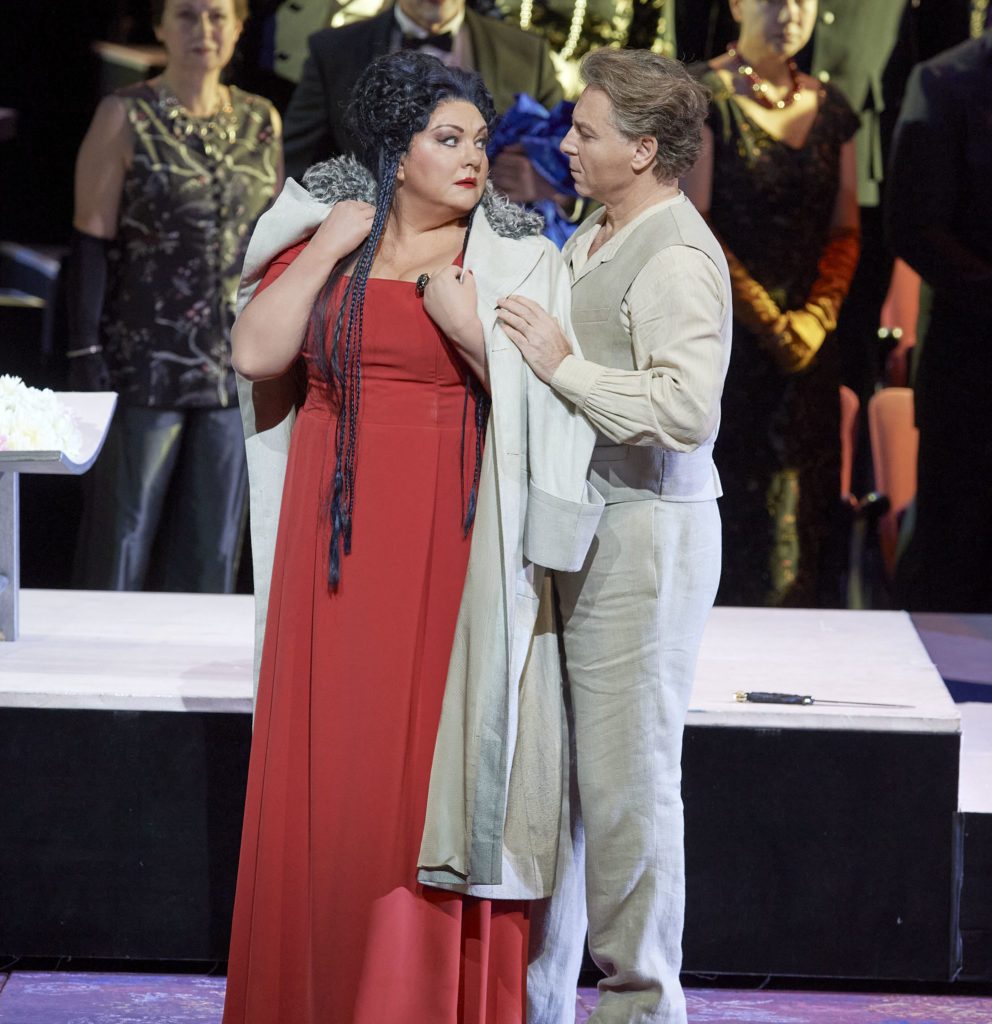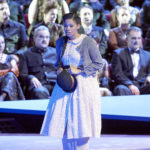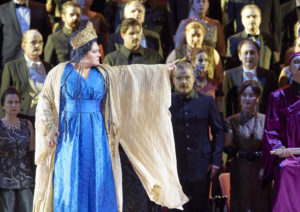 We think of Turandot as the icy Princess of Death: based on a 12th Century Persian story, the archetypal virgin, strong, independent, undefeated- demanding three riddles, rather than subjugate herself to male suitors. The Amazon, this lethal female, will have every man killed who threatens her independence. But Puccini’s Turandot ,(libretto G.Adami, R.Simoni), beginning of 20th Century, is influenced by Freudian subconscious motives. In her great aria, (‘nobody shall have me’), Turandot sings of the rape of her ancestor, for whom Turandot repeatedly takes revenge. Puccini implies her fears of her own loss of self-control. In the finale, Puccini portrays her as a vulnerable, human figure, traumatised. Puccini empathizes with his women characters, Turandot increasingly sympathetic. As with Tosca and Manon Lescaut, we identify with the strong woman confronting savage, rapacious male authority. Whereas Calaf’s victory is problematic. (Restrain that raging madman!) Arguably, Calaf, sexual-aggressor, is not a ‘lover’, but a man physically obsessed, in a fever: ‘I want the triumph; I want love’. (Whereas the slave Liù, devoted to Calaf and whose life saves him, represents a selfless love.)
We think of Turandot as the icy Princess of Death: based on a 12th Century Persian story, the archetypal virgin, strong, independent, undefeated- demanding three riddles, rather than subjugate herself to male suitors. The Amazon, this lethal female, will have every man killed who threatens her independence. But Puccini’s Turandot ,(libretto G.Adami, R.Simoni), beginning of 20th Century, is influenced by Freudian subconscious motives. In her great aria, (‘nobody shall have me’), Turandot sings of the rape of her ancestor, for whom Turandot repeatedly takes revenge. Puccini implies her fears of her own loss of self-control. In the finale, Puccini portrays her as a vulnerable, human figure, traumatised. Puccini empathizes with his women characters, Turandot increasingly sympathetic. As with Tosca and Manon Lescaut, we identify with the strong woman confronting savage, rapacious male authority. Whereas Calaf’s victory is problematic. (Restrain that raging madman!) Arguably, Calaf, sexual-aggressor, is not a ‘lover’, but a man physically obsessed, in a fever: ‘I want the triumph; I want love’. (Whereas the slave Liù, devoted to Calaf and whose life saves him, represents a selfless love.)
At Vienna State Opera, Marco Marelli’s over-clever, post-modern production – confusing when premiered 2016, depicting a ‘Chinese’ totalitarian state, with modern-dressed soldiers- now in 2020, cutting edge. Turandot’s henchmen, plain-clothed and uniformed, instrument her tyranny; while Chinese jugglers, acrobats and choreographed puppets interweave the traditional fable. The music box, Chinese-themed curtain, opening live puppets- emblematic, Chinese iconography- prefigure the Mandarin’s proclamation. ‘Turandot will only marry the man who can solve her three riddles; but whoever fails must die.’
In the opening, a crowded execution scene, Calaf recognizes the deposed, disguised King Timur, with slave-girl Liu. In this casting, it’s appropriate they’re represented by black singers. Liù is sung by South African Golda Schulz, with her rucksack, as if carrying the burdens of the world, her soprano magnificent in a heart-rending performance. ‘Why do you take his grief upon you?’ She’s devoted to the banished (Tartar) King, played by an ‘ageing’ white-haired Ryan Speedo Green, his bass on terrific form.
A mill-grinder centre-stage is sharpening fearsome-shaped swords; brandished by jousting youths; jugglers vie with acrobats performing cartwheels. We are back through the clouds of time. All observed by a modern audience of stiffs, in their seats, facing us back of stage.
The Chorus (Vienna State Opera) sing, the graves yearn for your funerals. Sophisticated hokum? But what an incredibly refined sound palate Puccini indulges us with! (Puccini, ever pursuing the authentic, discovered seven original Chinese melodies, which he incorporated in the score.)
Now, as ‘the Ice Queen cometh’, they’re all carrying white balloons, reflections of a huge silver moon. ‘Princess ease my pain, Chorus murmur. She’s very tall- with long black hair, plaited- trailing an immense silver gown. Other side of stage, the Executioners. ‘His eyes have the ardour of youth. Have mercy, Princess!’
As Prince Calaf, Roberto Alagna, now mustachioed, handles the exotically patterned drapes side of stage. What is he doing? (mutter the Queen’s men.) Her presence mingles everywhere, as if she’s omnipresent. Timur, captive- the giant, broken figure of Speedo Green, but with a helluva voice- warns (his son) ‘Do you want to die like that!’ But Alagna, addicted by the fleeting image of Turandot (from a balcony, signalling the executioner), is spellbound: ‘I will triumph for her beauty!’ He’ll take the risk. Go back to your homeland! they sing. She’s nothing but bare flesh. And, in a chorus of misogyny, Give up women: even Turandot is only arms and legs! But Calaf, obsessed, sings of Turandot, her fragrance fills the night.
Alagna, short of stature, but a mesmerising actor, has commanding stage presence, his tenor still a beautifully lyrical instrument. Still they’re telling him beware of her riddles. And Turandot ‘doesn’t exist’: a myth, a love goddess. But Alagna, undeterred, all-passion, I want to win, love her!
As Liù and Timur try to dissuade him, Calaf asks Liù to continue to care for Timur. Liù’s aria is sung like a spiritual. We shall die in exile: she’ll make the path of exile easier for him. And, next scene, Ping, Pang, Pong (Chinese Governors) try to restrain Calaf’s raging stranger. In Puccini’s comic diversion (Act2), they sing, ‘Farewell love: China no longer exists.’ They welcome the night when she surrenders to her suitors.
ENOUGH YOUNG MAN, LEAVE! He still wishes to undergo the trial. But Alagna is no longer ‘young’, a fine romantic tenor, if not quite up to the high Cs. Usually it’s the pale, ethereal Turandot confronted by the virile Prince, she ravished, as much by his gleaming tenor. But here, in a fluke of casting, the battle of the sexes, is played differently.

A mysterious figure in royal blue, veiled. In questa reggia. One thousand years ago a voice sounded in the palace. Lou-Ling, robbed, and raped. Many generations later this pierces my soul! …THIS Turandot,, soprano Elena Pankratova, is quite something. Not the usual, wan, lithe , western versions of the ‘goddess’. She’s darker-skinned, eastern, sexy, exuding sensuality. Even- hushed adulation- a Jessye Norman figure. She intones, Grim death lives in me; do not challenge your fate. We believe her. Utterly sensational, she is the Turandot for our age.
She poses the riddles to Calaf. A phantom rises every night to be reborn- Turandot! Hope… Imperious, holding her head high in contempt, at first she mocks him. But with each win, she’s increasingly shaken, disarmed. She’s defenseless, disorientated.
Desperate, she pleads to her father, Altoum, Don’t drive your daughter into the arms of a stranger! She’s sacred, cannot be given to him like a slave. Then to Calaf- she’s now wearing a red gown- Don’t look at me like that! I shall never be yours! (No man shall ever possess me)- While Chorus murmur: He gambled his life for you! Alagna, in a white suit, stands over her: I want you aflame with love, my proud Princess. He’s solved her three riddles, (now will give her his love.) But offers her a reprieve: tell me my name, then he’ll gladly die at dawn!
Nessun dorma. The chorus repeat the Princess’s decree, all will die. No one knows his name! Vanish night. In the iconic aria, Alagna, his tenor mellowed, sings with style, warmth and passion.My secret is safe; no one will know my name! (They offer him a bed-full-of whores, ‘nocturnal gems.’)
In the iconic aria, Alagna, his tenor mellowed, sings with style, warmth and passion.My secret is safe; no one will know my name! (They offer him a bed-full-of whores, ‘nocturnal gems.’)
Act 3, Pankratova’s in a black veil, sparkling with sequins. They threaten Liu with torture; loyal to Calaf, she won’t reveal his secret. Liu in simple white, Turandot like a deadly spider, the supernatural against all-too-human beauty. Schultz, in the pathos of Liù’s aria, movingly addresses Turandot, icy Princess of death, through her sacrifice, ‘you too will love him.’
In the seduction scene, with Pankratova and Alagna, we’re in operatic heaven. He grasps her veil. But she sings defiantly, her spirit is far away. He, but her body is near…
To us, in the MeToo age, this is problematic, hardly consensual. She sings, how at first she felt anguish, but ‘the thrill of the greatest of all sacrifices.’ Then in his eyes shone the light of heroes, and loved him for it. She, convinced, not by the trial but, ‘the fever that springs from him.’ And she knows he has won.
Yet Puccini, who had difficulty portraying the humanisation of Turandot, left the Finale unfinished. Would he have approved of the brilliantly up-beat ‘Hollywood’ celebratory ending of Marelli’s staging? She’s lost her dignity and virginity. But it’s as if the ‘onstage’ audience are applauding her downfall and submission. Notwithstanding directors conceits, Ramon Tebar conducted Vienna State Opera in a riveting performance. © PR 4.3.2020
Photos: Elena Pankratova as Turandot, Roberto Alagna as Calaf; Golda Schultz as Liù; Elena Pankratova, Turandot; Roberto Alagna, Calaf
© Wiener Staatsoper/ Michael Pöhn

Hello There. I discovered your blog the use of msn. That is a very well written article. I will be sure to bookmark it and come back to learn extra of your useful information. Thank you for the post. I will definitely return.
Currently it looks like WordPress is the top blogging platform available right now.
(from what I’ve read) Is that what you’re using on your blog? http://rhlug.pileus.org/wiki/User:MartiBouchard
Absolutely! I’ve been using WordPress since I set up this blog, viennaoperareview.com.
I’m very grateful to WordPress for their ‘free package.’ WordPress has been a pioneering community resource for bloggers for decades.
However, we all have problems with spam, so you will need to install an an anti-spam plug in (Akismet).
And you are responsible for your own internet security, and should already an anti-virus package to protect from hackers.
Good luck.
I blog quite often and I seriously thank you for your information. This great article has really
peaked my interest. I am going to book mark your website and keep checking for new information about once a week.
I opted in for your Feed too.
I wanted to thank you for this very good read!! I definitely loved every bit of it.
I’ve got you saved as a favorite to check out new stuff you post…